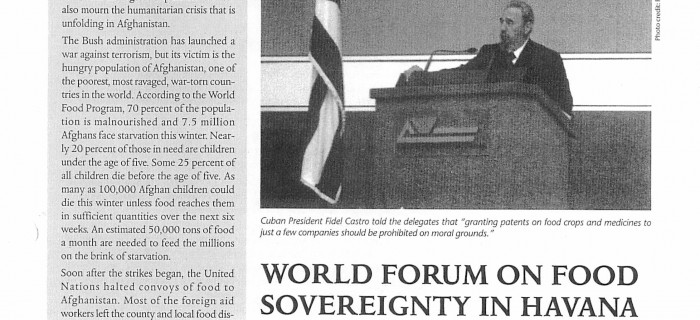World Forum on Food Sovereignty in Havana
From September 3-7 of this year, more than four hundred representatives of farmer, fisher, and nongovernmental organizations representing 60 countries met in Havana, Cuba. Their aim was to develop common positions for the upcoming “World Food Summit-Five Years Later” conference to be hosted by the UN in Italy next June.
At the core of civil society’s concerns was the failure of the world’s governments to make any effort or progress toward meeting the rather pathetic goal agreed co at the 1996 summit–to reduce the number of hungry people in the world by half by no later than 2015. The delegates placed the blame for this failure on trade liberalization under the World Trade Organization, the pro-business and budget-slashing policies of the World Bank and International Monetary Fund, and market-based and “technological fix approaches– such as the promotion of generically modified crops. Similarly, the patenting of life was addressed as encouraging excessive corporate control over our food system.
Economic, agricultural, fishing and trade policies imposed by the World Bank, IMF, and WTO, and promoted by transnational corporations, have widened the gap between wealthy and poor countries and accentuated the unequal distribution of earnings within countries. They have worsened the conditions of food production and access to healthy and sufficient nutrition for the majority of the world’s peoples, even in the so-called developed countries. As a consequence, the most basic human right of all, the right to food and nutritional well-being as stated in the Universal Declaration of Human Rights, is not guaranteed to the majority of the world’s peoples.
Also in this issue of News & Views:
- World Trade Organization and its Next Ministerial


 Help Food First to continue growing an informed, transformative, and flourishing food movement.
Help Food First to continue growing an informed, transformative, and flourishing food movement.




